Recent Commercial Posts
Tips for Salvaging Electronics After a Fire
1/26/2022 (Permalink)
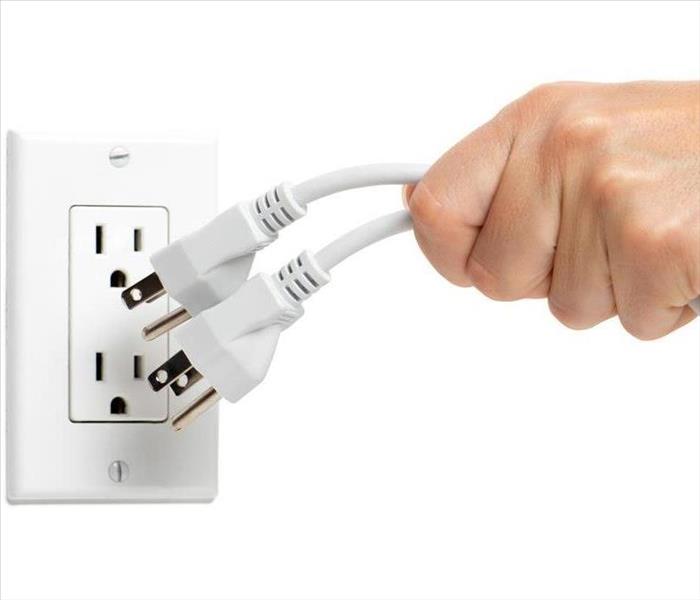 Following an electrical fire, you should unplug everything.
Following an electrical fire, you should unplug everything.
How to Recover Electronics After a Fire
An electrical fire can result in significant property damage. These fires can result in damage to the building itself or to the possessions inside, including electronics. This is a frightening prospect for business owners in Columbia, TN, who are worried about spending a lot of money to replace computers, appliances and other electronics. Fortunately, a professional fire damage remediation service can help get your electronics back up and running soon. Here are some things to keep in mind to stop you from doing more harm than good.
1. Keep Warranties
Most warranties will cover damage that occurred as a result of disasters. You should hang onto the warranties for all electronics from computers to microwaves. Most of these warranties will be good for at least one year.
2. Unplug Everything
Following an electrical fire, you should unplug everything. There are a couple of reasons why this should be done. A fire could cause additional damage to an electronic if it is still receiving power. There is also a concern that the water brought in by firefighters to subdue the fire could cause the electronics to malfunction.
3. Do Not Attempt to Turn Electronics Back On
Some electronics will still technically be fine after a fire. However, if you attempt to turn them back on without having a professional remediation expert look at them first, then they could short-circuit. Water may be present in the system. That water can be removed and the rest of the items can be salvaged, but if you turn them on when components are still wet, then you could inadvertently damage something that would have been fine without your intervention.
The best course of action immediately following an electrical fire is to simply leave electronics alone. Let a professional handle the computer cleanup. Trying to fix something without knowing what you are doing could end up costing you more.
Prevent a Disaster With Proper Fire Sprinkler Maintenance
12/28/2021 (Permalink)
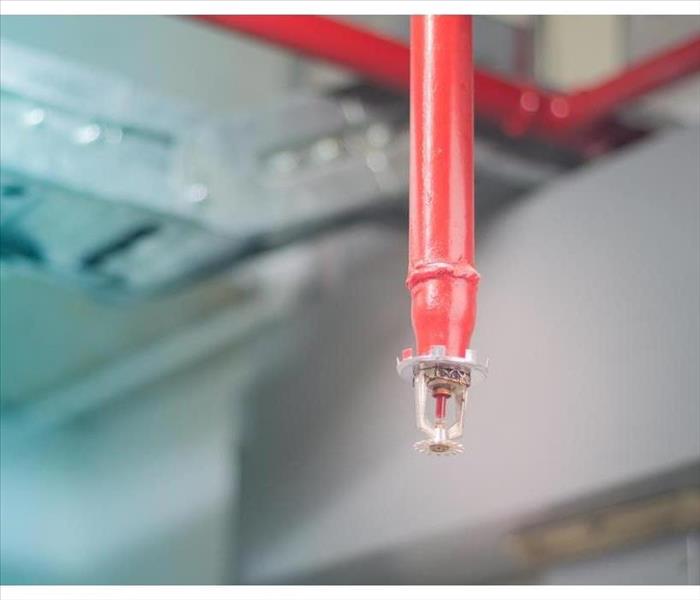 Keeping up with your fire sprinkler maintenance is just as important as fire prevention.
Keeping up with your fire sprinkler maintenance is just as important as fire prevention.
Fire Sprinkler Maintenance
Fire sprinkler maintenance is an easy thing to forget when most businesses will never experience a fire. Fire sprinklers on your Spring Hill, TN, property need to be checked regularly in order to prevent a disaster. When sprinklers fail to turn on, the fire damage can be devastating. Follow these simple steps to ensure your sprinklers work well.
1. Make Sure the Water Is Turned On
It may seem obvious, but missing this step can be devastating. Confirm the water valves leading to your sprinklers are turned on. This step needs to be performed after all maintenance jobs involving water valves.
2. Do Not Paint Over the Sprinklers
Perhaps it is tempting to paint over fire sprinklers to help them blend into the décor. However, it is important to remember they are functional, not decorative. Paint can block water flow, thus preventing them from fulfilling their purpose.
3. Do Not Block the Sprinklers
Make sure you do not block sprinklers, especially when utilizing precious storage space. Sprinklers cannot do their job well if they are obstructed.
4. Check for Corrosion or Build-up
This sprinkler maintenance step is similar to not painting over the sprinkler system. Make sure to periodically check for corrosion or buildup so the sprinklers can work optimally.
5. Make Sure the Sprinkler Pipes Don’t Freeze
Saving money by turning the heat down in an empty building may seem like a practical choice. The problem is that wet pipes can freeze in cold temperatures, preventing the sprinklers from functioning properly. Keep your building warm enough to prevent freezing pipes.
6. Do Not Hang Things From Sprinklers
While it is tempting to hang items from sprinklers, remember that sprinklers are not meant to hold any kind of weight. Hanging things from sprinklers can cause them to bend or break, and a broken sprinkler is no help if there is a fire.
Keeping up with your fire sprinkler maintenance is just as important as fire prevention. Even with proper maintenance, accidents can still happen. When they do, your emergency restoration services partner can help get you back to work again.
Help Prevent Fire Damage In Your Commercial Kitchen With These Tips
12/23/2021 (Permalink)
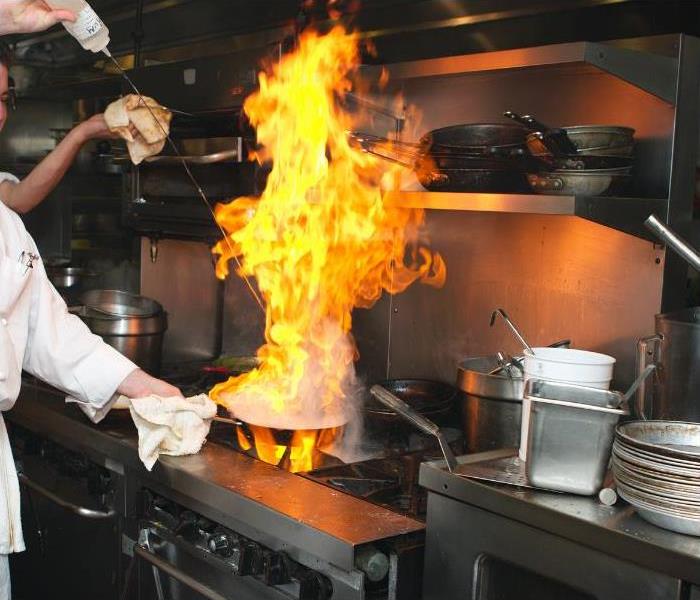 Fire in a Commercial Kitchen While Cooking
Fire in a Commercial Kitchen While Cooking
If you own a restaurant, bar or commercial kitchen in Columbia, TN or Hollywood, TN, reducing fire risk is critical to continued profitable operation. The National Fire Protection Association (NFPA) reports that fire departments responded to over 7,410 structure fires in the kitchen of restaurants and bars in 2017 alone. Most of these fires were preventable, resulting in three deaths, 110 injuries, and $165 million in property damage annually in commercial kitchens. These tips will help keep you and your staff safe while preventing shutdowns due to fire code violations.
What Are My Ducting and Air Movement Requirements to Prevent Fire?
While Chapter 7 of the NFPA 96 Standard for Ventilation Control and Fire Protection of Commercial Cooking Operations covers this extensively, here are a few key items to keep in mind.
First, commercial kitchen ducts should never pass-through firewalls, share an exhaust system with the building ventilation, or have obstructed access panels. While doing these things on a commercial kitchen remodel can save costs in the short term, the fire risk increases significantly. If disregarded, your commercial kitchen work will likely not pass inspection.
Make sure to maintain a minimum clearance of 18 inches between combustible materials and the kitchen ducts. This standard is based on Section 4.2 of the NFPA 96, however is one of the easiest to disregard once the kitchen is operational. Ducts can build up high levels of radiant heat that can ignite combustible materials like boxes, cups, plates, utensils, or other kitchen materials.
If you would like additional information on the types of combustible and non-combustible materials that should and shouldn't be kept near the duct, consult Chapter 3 of the NFPA.
What Are My Commercial Kitchen Fire Extinguisher Requirements?
"The NFPA 96 requires automated fire suppression equipment for all grease removal devices, hood exhaust plenums, and exhaust duct systems in a commercial kitchen, as well as any cooking equipment that produces grease-laden vapors." - Koorsen Fire & Security
The NFPA 96 requires use of class K fire extinguishers in conjunction with automatic fire extinguishing systems. These extinguishers also require installed placards stating their extinguisher class. However, in the case of a commercial kitchen fire, it's critical to activate the automatic fire extinguisher system before using portable-type extinguishers. This is because high-efficiency cooking appliances in many modern commercial kitchens are capable of achieving high temperatures that can raise the vegetable oils to intensely high temperatures. When oil ignites at these high temperatures, it can already be so hot that a portable extinguisher is not enough to stop the flames.
Another standard that you should familiarize yourself with is the UL 300 standard.
According to this article by Insureon, a kitchen’s cooking equipment must meet these UL 300 requirements:
- Fire-extinguishing nozzles in the hood, ducts, and above each cooking appliance
- An automatic fuel shut-off capabilities for both gas and electric power sources
- A manual fuel shut-off pull for all power sources
- A wet-chemical fire-extinguishing system that meets UL 300 criteria (one of which is undergoing semiannual checkups by a certified professional)
If you need immediate assistance after a fire, our teams are available 24/7/365. With our promise of being Faster to Any Size Disaster, you can count on SERVPRO of Maury/Giles Counties to be there when it counts. Call us today at (931) 388-4248 for rapid assistance.
If You Rent, Who Is Liable for Fire Damage?
10/28/2021 (Permalink)
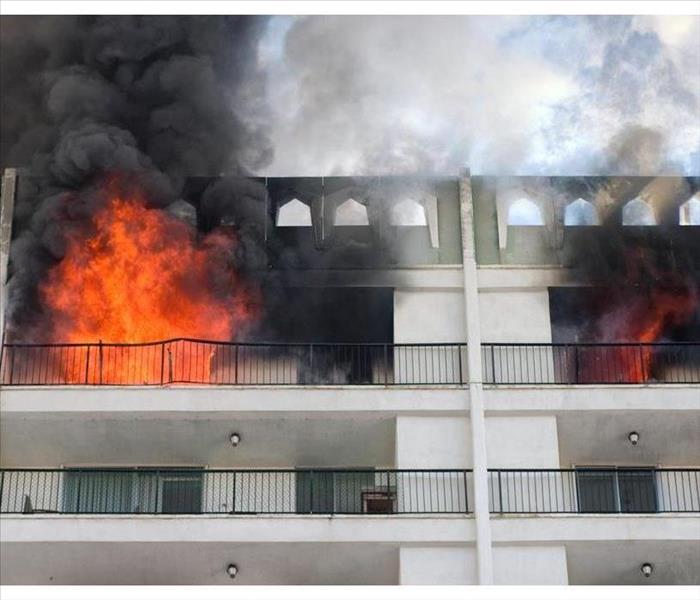 Apartment fire in Columbia, TN.
Apartment fire in Columbia, TN.
Who Is Liable for Fire Damage If You Rent?
When tenants occupy a rental property in Columbia, TN and that property is subsequently damaged by an apartment fire, it can be confusing to work out who’s liable for any damages and items lost in the fire. The tenants don’t own the building but they do still pay to occupy it, so if there’s a fire, who’s responsible for covering the damage?
Understanding Building Liability vs. Content Liability
The difference is determined by who actually owns the property that’s been damaged in an apartment fire. The proprietor owns the building and thus is liable for any structural damage to the building – that means damage to the walls, roofing, fixtures, pipes, and so forth. The tenant owns the contents of their apartment and is liable for those items. Items that tenants may be liable for include:
• Electronics such as televisions, stereos, and DVD players
• Clothing
• Furniture
• Personally owned kitchen appliances
• Art and other decorations
• Books
• Pet care items
• Vehicles or bicycles damaged during the fire
• Personal belongings with or without sentimental value
There may be some confusion regarding appliances, as some appliances will be owned by the tenant and some by the property owner. For example, a refrigerator or stove that was installed before a tenant moved in belongs to the property owner, and thus the owner is liable for any fire damage. However, a coffee maker or toaster likely belongs to the tenant, and the tenant is liable. Determination is made purely on who covered the cost of purchase/ownership.
So What Happens After the Fire?
After the fire, damages are usually assessed by both damage remediation companies and insurance companies. Building owners should have adequate insurance to cover any damage to their properties in the event of an apartment fire. Many tenants do not invest in renter’s insurance, but renter’s insurance usually covers the cost of replacing any destroyed or fire-damaged items that tenants are liable for.
Don’t Dish Up Mold in Your Restaurant
7/26/2021 (Permalink)
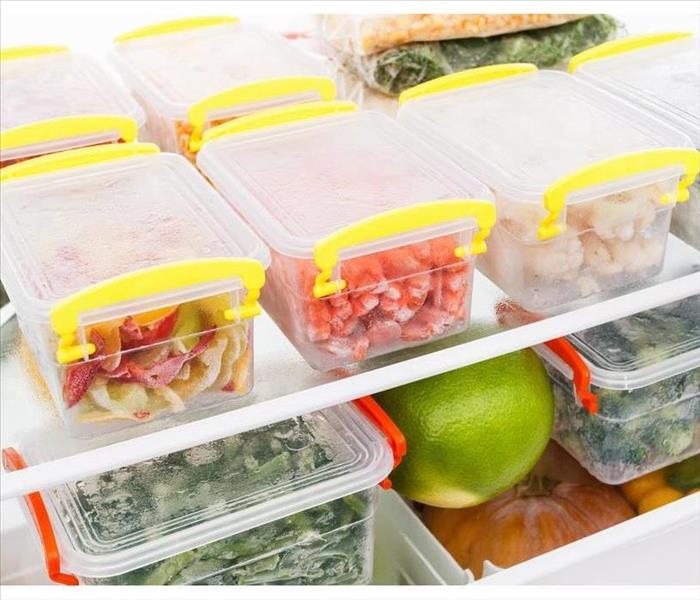 Store food properly.
Store food properly.
Mold Is Not Something You Want To Serve at Your Restaurant
Customers enjoy coming to your restaurant in Pulaski, TN because they value your delicious, high-quality, fresh food. So how can you keep it all fresh and avoid mold growth in the kitchen? Make sure you don’t dish up something unexpected by taking a few precautions.
1. Store Food Properly
When appropriately stored, food can remain fresh and mold-free for three to four days, allowing you to use as much of your inventory as possible. Store canned items in new, clean, covered containers and cover fresh foods with plastic wrap to keep moisture in. Keep all foods refrigerated at the proper temperature, 40 degrees or below, to prevent mold growth. You can also decrease high humidity issues in your refrigerator by not packing in too much food and allowing proper air circulation.
2. Ventilate Appliances Correctly
Steam and warm air are the perfect environments for growing mold, and of course, that is the definition of a fast-paced restaurant kitchen. It is important to make sure that moisture-creating appliances are vented outside and that you have a high-functioning HVAC system to help circulate outside air into your work area. Maintain your HVAC system and check drip pans regularly for cracks in the bottom or overflowing liquid, as that can lead to damage and unnecessary repairs.
3. Address Leaks Quickly
Regularly checking appliances allows you to catch any leaks quickly. However, if you find that you didn’t catch the water damage in time, there are professional remediation specialists who can prevent further damage and control existing issues. Addressing the problem in a timely manner can keep costs down.
Your highest priority is to serve the best food Pulaski, TN, has to offer, and these steps can help make certain that you can do that every day. Storing your food carefully, ventilating appliances correctly and quickly fixing any leaks can prevent mold growth and help keep your kitchen healthy and efficient.
Preparing Your Business To Operate Even After Adverse Weather Events
6/28/2021 (Permalink)
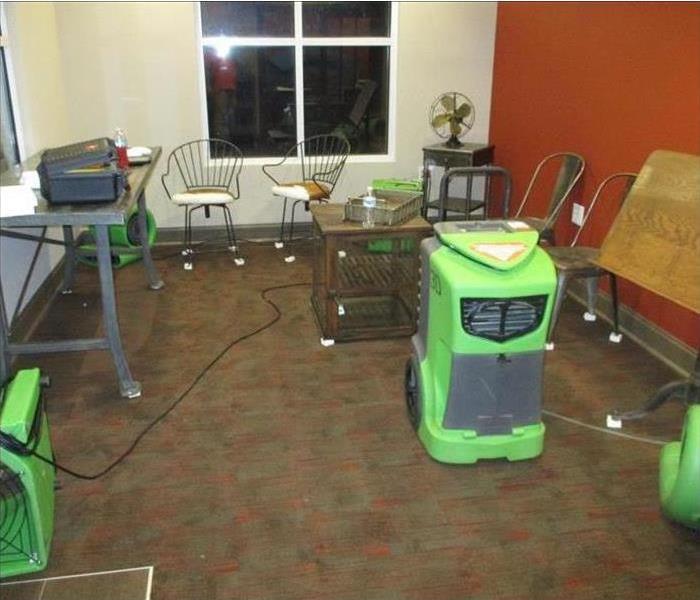 The drying process in a Spring Hill, TN office.
The drying process in a Spring Hill, TN office.
Prepare Your Business From Natural Disasters With The Following Four Steps
A storm can be especially disruptive to normal business operations. One way to stay functional in the face of natural disasters is to develop a continuity plan before trouble ever strikes. By doing so, you can prevent surprise weather from cutting off operations for the foreseeable future. With these four steps, you can be prepared for whatever nature throws at your business.
1. Prepare a Plan for Major Events
You should plan for any potential disaster that could hit your business at its current location. These can include but are not limited to hurricanes, flooding, blizzards, ice storms, or tornadoes. Whatever historically happens in the region should be countered with a plan.
If possible, a team of employees should be assigned duties for enacting the procedures. Emergency suppliers are worth arranging with for disaster mitigation. This is also a good time to make and safely store a copy of the building’s insurance policy. Any computer data should be consistently and securely backed up off-site or in a cloud service.
2. Create Checklists
Once a procedure is worked out, checklists are ideal so everything can be easily recalled. These are worthwhile to review and check off several days before a forecasted natural disaster. All employees should be informed of where these checklists are and required to review them occasionally throughout the year.
3. Practice the Procedure
In areas where dangerous weather can strike with little notice, preparedness drills are recommended. This ensures the continuity plan is fully functional and no important part is missing if the time comes to follow the actual procedure.
4. Establish Communication and Alternate Work Locations
All essential employees can be asked to provide an emergency contact number to arrange work. The business location could become devastated by storm damage or be undergoing restoration by an expert storm damage cleanup team. This alternative location can be working from home or another designated commercial property.
Preparation is vital to protecting your business in Spring Hill, TN, from many days of lost revenue and catastrophic loss. With a continuity plan, you can be ready for the worst and more than prepared for most other storms.
What Coverage Is Included in Commercial Property Insurance?
4/19/2021 (Permalink)
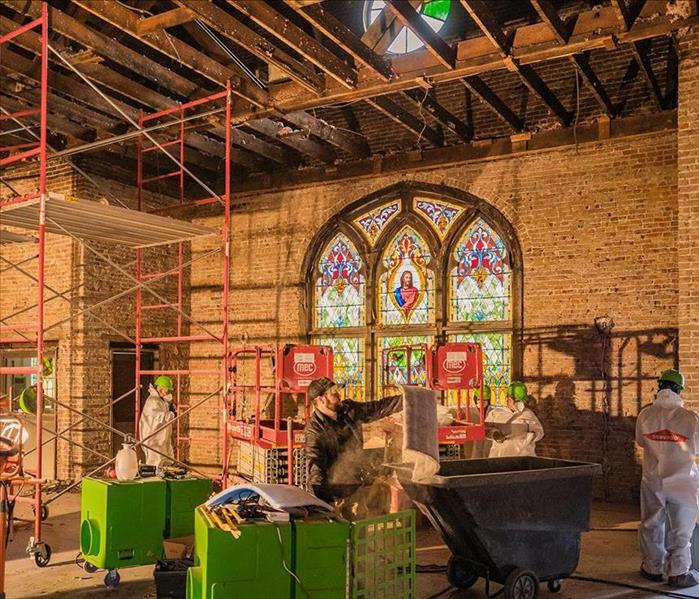 Make sure your building is insured.
Make sure your building is insured.
As a business owner, you know how important commercial insurance is for your property in Mount Pleasant, TN. Without adequate coverage, you could be responsible for paying for the extensive damages after a fire.
What Should Be Included in a Commercial Property Insurance Plan?
Buildings – All buildings owned by the business must be covered. For example, if you own one main building but also have a small warehouse at a different location, that second building must be included in the insurance plan. Even small storage units should be identified. Get coverage for the premises around the building as well. This includes outside furniture and other fixtures, landscaping and fencing.
Manufacturing Equipment – The equipment used in manufacturing, assembling and processing must be identified in the insurance package.
Office Equipment – Computers, printers, furniture, phones and other office equipment should be covered in your commercial insurance plan.
Inventory – If you house finished goods at the premises, this should be mentioned in the insurance package.
What Important Situations Do Insurance Companies Consider?
The location of your building is important to your insurance agent. If there is a fire department nearby and fire hydrants close to the property, this may reduce your premiums. The type of construction used in your building is also a key factor. Fire-resistant materials used in the flooring, insulation and walls keep costs down.
Every business should invest in a well-designed fire alarm and sprinkler system. Fire sprinklers are activated by the heat below, so only those sprinklers in the direct vicinity are turned on during a fire. By comparison, a fire department hose is very powerful and can cause a lot of damage from water. If you are in need of restoration after water or fire damage, contact a fire restoration service as soon as possible.
Talk with your insurance agent to ensure that your commercial insurance plan is able to fully protect you after a devastating fire.
4 Ways to Prevent Mold Growth in Humid Conditions
2/2/2021 (Permalink)
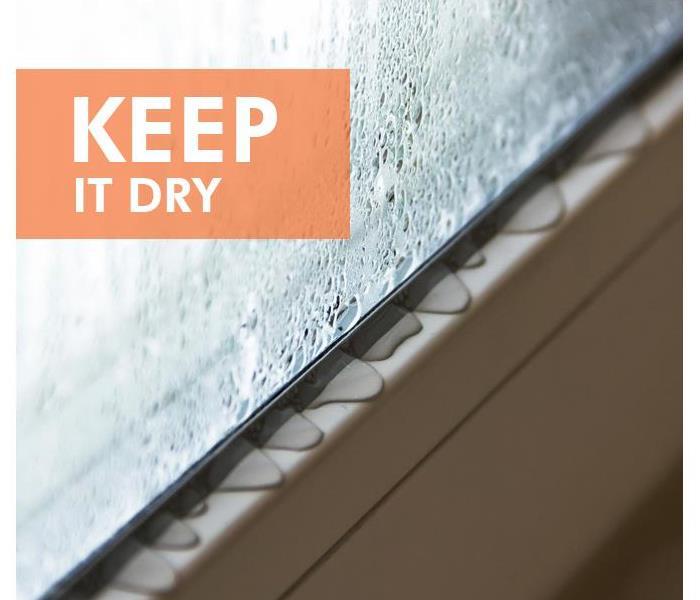 Regularly wipe away moisture to keep mold from growing around the window sill.
Regularly wipe away moisture to keep mold from growing around the window sill.
Preventative Measures That May Help You Avoid Needing Mold Clean Up Services
Property owners in Mount Pleasant, TN, know that high humidity is a given. They also know that mold loves the excess moisture it produces. While it can be a challenge to prevent its growth, taking a few preventive measures may help you avoid needing mold clean up services by a mold remediation and restoration specialist
1. Maintain Optimal Temperatures
Going from hot, smoldering days to cool evenings makes it difficult to avoid mold damage. Maintaining an ideal temperature is an easy way to avoid that. When the thermometer rises, ensure the air conditioner is set to 70 degrees. It is also vital to keep indoor humidity levels below 60%. Consider running a dehumidifier on days when the A/C has a tough time keeping up. If the humidity levels outside are lower, letting some fresh air helps enhance airflow and ventilate the property.
2. Check for Condensation
While you may be focused on the high humidity outdoors, there is a good chance there are appliances or fixtures that are prone to condensation, such as windows, pipes, walls and HVAC systems. Ensuring they are properly insulated is necessary to minimize any moisture buildup. It is also important to regularly inspect appliances for leaks.
3. Minimize Moisture Coming Inside
Maintaining a dry indoor environment means staying on top of minimizing outdoor precipitation from making its way in. Regularly inspect gutters and downspouts for debris or damage to ensure the system is draining properly. To minimize a basement getting a slow leak, verify that the grading is sloping away from the property.
4. Consider Using Mold-Resistant Materials
If the battle seems to be ongoing, it may be time to reinforce the property with newer materials. There are various mold- or water-resistant products available. From primers to wallboards and drywall, replacing porous materials may be an upfront investment, but they may provide much-needed peace of mind.
Knowing that high humidity is a constant, taking a few measures to guard against can go a long way.
How Can You Be Certain Your Commercial Fire Sprinklers Are Ready?
12/28/2020 (Permalink)
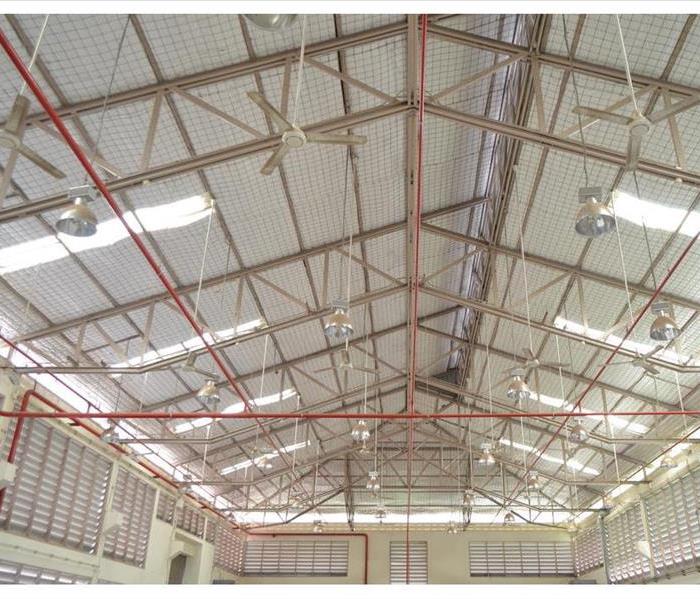 A fire sprinkler is the most effective means of protecting life and property in buildings
A fire sprinkler is the most effective means of protecting life and property in buildings
A fire sprinkler is the most effective means of protecting life and property in buildings. They’re so effective, one study in Texas found they literally eliminated deaths from commercial fires when properly maintained.
But what does it mean to maintain them? It can be a little confusing. Fortunately, the National Fire Protection Association has an easy-to-understand rulebook for this, called NFPA 25.
What Is NFPA 25?
NFPA 25 is the internationally recognized standard for fire sprinkler maintenance and testing. It lays out fire protection system requirements and details for the following mandatory sprinkler system inspections:
- A simple weekly one
- An in-depth monthly one
- A quarterly inspection and test
- A yearly inspection and test
- A 5-year complete system inspection
Can I Do My Own Inspections?
Generally, you can do weekly inspections in-house. However, all other inspections require certification in fire suppression system maintenance and repair. Columbia, TN, has strict rules about who can perform inspections. The sprinkler system not only protects the business, but it also protects surrounding structures and the lives of everyone inside. Plus, it reduces insurance claims, so it’s crucial that they be independently tested.
What’s Involved in Each Inspection?
The weekly inspection that you can perform just looks for anything obvious that’s wrong, such as items stacked too close to sprinkler heads or leaks in the system. You can find a simple list here.
The monthly fire sprinkler inspection inspects gauges, alarm valves and all the piping to ensure nothing looks out of place. The quarterly one involves some basic pressure switch tests, a thorough inspection of the risers, and a review of the required system documentation.
The annual and 5-year inspections cover the entire system and spare parts you’re required to carry. The 5-year one will also test the pressure of your system and the accuracy of the gauges.
The good news is that, when well-maintained, your sprinkler system will unlikely ever have an accidental discharge. The bad news is that if it does, you’ll have a fire sprinkler cleanup to deal with. This is covered by insurance, so have restoration professionals inspect the damage and begin the cleanup process.
The 3 Most Common Water Issues in Commercial Buildings
12/8/2020 (Permalink)
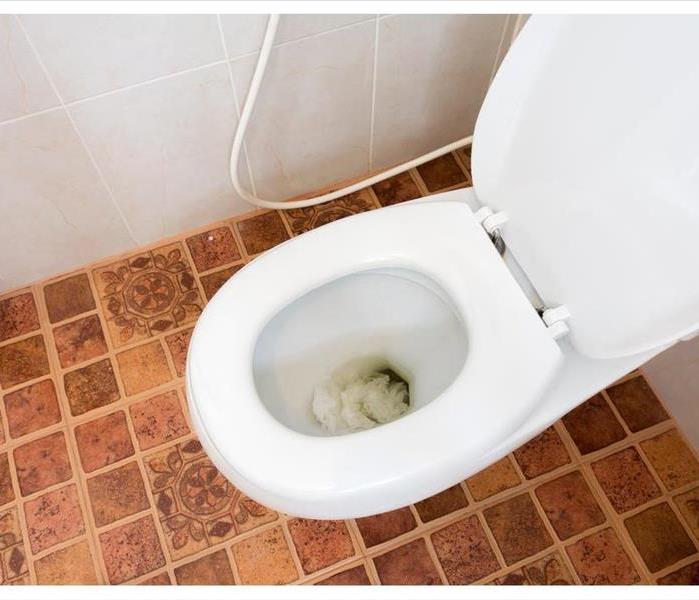 Toilet clogs are a common water issue found in a commercial building
Toilet clogs are a common water issue found in a commercial building
The 3 Most Common Water Issues in Commercial Buildings
Owning a commercial building in Columbia, TN can be an excellent way to generate income. If you maintain your building well, it can last for generations – even becoming a landmark. However, poor maintenance often leads to many problems, such as leaking pipes.
This can cause quite a few issues. Some are more or less inconveniences; others can be disastrous for a building. The three most common water issues found in commercial buildings in this region are:
- Toilet clogs
- Pinhole leaks
- Foundation cracking
Clogged Toilets Can Cause Damage
Some toilets, especially older ones, tend to cause more clogs than others. If the toilet backup doesn’t spill outside the bowl, it’s just a nuisance. However, once septic water does escape the bowl, it can easily get into absorbent construction materials.
If the water is septic, it can cause disease if not properly disinfected. If it’s relatively clean, it can severely damage drywall and floorboards. Some tenants are better than others at protecting your building, so if you have frequent complaints about a toilet, it’s to your advantage to fix it quickly.
Pinhole Leaks Are A Building’s Worst Enemy
Leaking pipes are eventually going to happen. All plumbing will eventually fail. Copper pipes gradually corrode, while PVC gets brittle as it ages. Unfortunately, plumbing is part of the invisible infrastructure, so leaks may go undetected.
A pinhole leak is quite common. It may be a slow drip or a steady stream – and it can go undetected for a very long time. This eats away at exposed materials, attracts wood-boring insects and can even cause huge black mold colonies. You need a top restoration company to fix the leak and inspect for hidden damage in this situation.
Foundation Cracking Can Be Caused by a Pipe Break
Once excess water from leaking pipes starts getting into the soil around a building, it will undermine it over time. If it happens under the foundation or its footings, it’ll lead to excess stress, often causing cracks. Repairing the damage can be costly if it’s not found quickly.
Why You Need Water Damage Coverage for Your Business
11/11/2020 (Permalink)
 If your business is covered, you can recover from that loss quickly and easily
If your business is covered, you can recover from that loss quickly and easily
Are You Covered?
Broken pipes, inclement weather and flooding can lead to thousands of dollars in water damage for your business. You are even endangered if your town has an unusually high tide coupled with a normal storm. Rivers overflow their banks, and the slightest upset in the weather can be catastrophic. Fortunately, you can protect yourself in the event of a flood with water or flood damage coverage.
It Covers Broken Pipes
A pipe break can, particularly one at night, can be devastating. It can go undetected for days or weeks until it creates foundation problems, drywall or plaster issues and dangerous mold and mildew. This mold and mildew may cause other unforeseen issues and costly settlements if it is left to grow. A single broken pipe can expose you to flood conditions, necessary water cleanup and future damages. Water and flood damage coverage can help you hire a remediation company in Mount Pleasant, TN to help mitigate these damages.
It Covers Floods
Floods are usually a product of weather. Unfortunately, the weather can be extremely unpredictable at best. Even a small amount of water inside your business can cause foundation damage and damage to your electrical system and electronics. This is to say nothing of the damage to your inventory, carpet and furniture. When your business floods due to rivers rising, hurricanes or other factors, flood coverage can help you replace your inventory, equipment and building with a minimum amount of downtime.
It Covers Your Downtime
When you own a business, downtime can cause serious financial problems. Until you have a chance to repair and rebuild, you cannot operate. Companies without comprehensive flood insurance find themselves rebuilding on their own. Those with it are back on their feet relatively quickly.
A water damage policy protects your business from the cost of damages and leaks in your commercial building. If your business is covered, you can recover from that loss quickly and easily.
We Help You Get Back To Business In Columbia
9/18/2020 (Permalink)
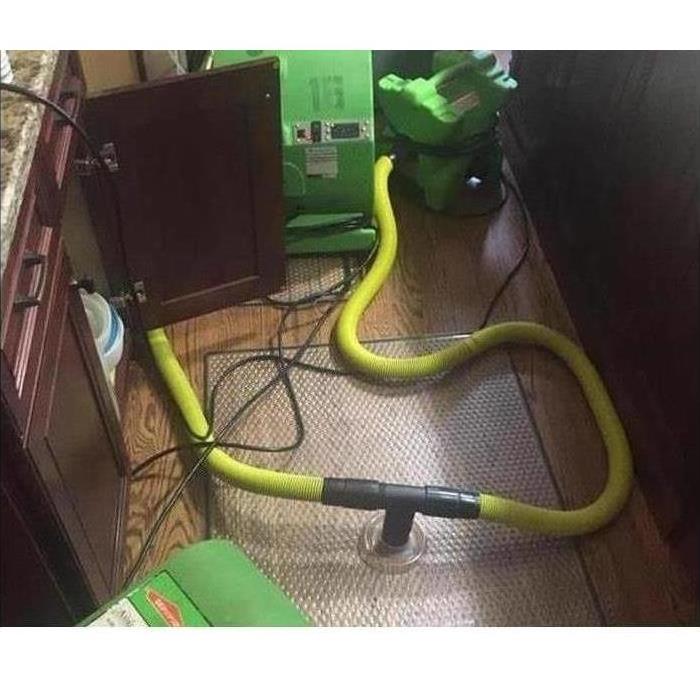 We have the equipment that can detect water that has seeped into the cracks in the floor of your business and act fast with our services.
We have the equipment that can detect water that has seeped into the cracks in the floor of your business and act fast with our services.
Overview of Commercial Water Removal for Columbia Service Industries
Commercial water damage can halt your business until it is mitigated. Besides the visible effect on the building structure, there are also safety issues and the possibility of secondary damage such as mold if the moisture is not removed as quickly as possible.
When SERVPRO performs commercial water removal in Columbia businesses, extraction is something we spend extra time doing because every bit of moisture removed beforehand, lessens the drying time and speeds the restoration process along. We know this is especially crucial for commercial properties involved in the retail and hospitality sector as they rely on foot traffic for a good portion of their revenue.
For water removal in a small area, we have portable extractors. Large scale water spills are no match for our truck-mounted pumps that can pull thousands of gallons of water in short order. In properties that have carpeting, we have weighted and stand-on extractor units that use weight to push water out of the padding and assist the carpet in drying. Each of these extraction methods helps in reducing water loss.
The other part of water removal occurs during the drying phase of restoration. Moisture lifted by the air movers during drying is disposed of using different types of dehumidifiers. Desiccant dehumidifiers are an effective way to remove excess moisture. A wheel coated with a substance such as a silica gel attracts the water vapor, and as it collects, the weight turns the wheel, and the water drops off into a disposal port, and the process begins again.
Our SERVPRO technicians have a goal of getting your commercial property back to the business of serving customers as quickly as possible. We communicate with you every step of the way to ensure you know what our technicians are doing throughout the restoration process.
What You Can Do To Protect Your Business From Fire
4/21/2020 (Permalink)
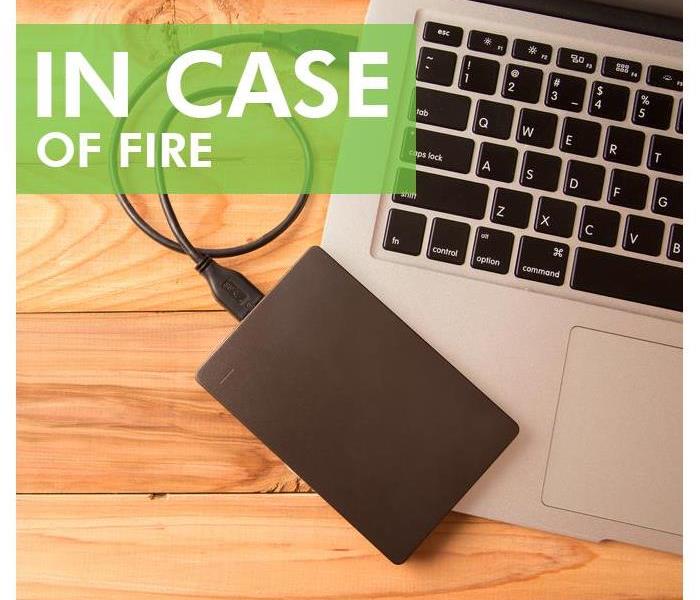 Begin to back up your paperwork to a server
Begin to back up your paperwork to a server
What You Can Do To Protect Your Business From Fire
You invested heavily in your business. It's been countless hours, days and years of building up clients and training staff. You've created a product or name that others respect. You don't want to lose it all overnight. As proprietor's in Columbia, TN, you're very much aware that fire preparation needs to be a priority. Your decisions may not stop something from starting, but it could make the road to recovery smoother, reducing the total amount of destruction.
1. Have a Plan
Knowledge won't stop a blaze, but it certainly can assist in keeping people calm and handling the situation. Therefore, create a disaster preparation plan for various emergencies. With a team, walk through the structure, thinking about how to evacuate, improve the walking paths and minimize vulnerable spots. Then, design several escape routes, including paths for those with disabilities. Designate leaders, gather personal numbers for contact and pick a location for others to gather. Also, review insurance policies, and have the name a of reputable fire restoration company on hand.
2. Backup Records
While losing merchandise and fixtures is hard, many often neglect to think about the impact of losing files. Financial records, contracts, and insurance policies are pivotal. Therefore, as part of the fire preparation stages, begin to back up your paperwork to a server, accessible from somewhere other than the building.
3. Install Preventative Devices
Because flames are unpredictable, fire codes were established to assist in mitigating fire damage. Thus, it's essential to consistently remain up-to-date on the current requirements. Hopefully, they'll keep the loss low as well as buy enough people time to leave. Your first line of defense is the sprinkler system. Consider having someone look at them periodically, at least once a year if not more than that. Along with this, have fire extinguishers within visible and accessible areas and run through fire drills a few times a year.
Take fire preparation seriously. Proactive choices could reap major rewards in the time of a disaster.
4 Steps to Ease Storm Repairs
3/9/2020 (Permalink)
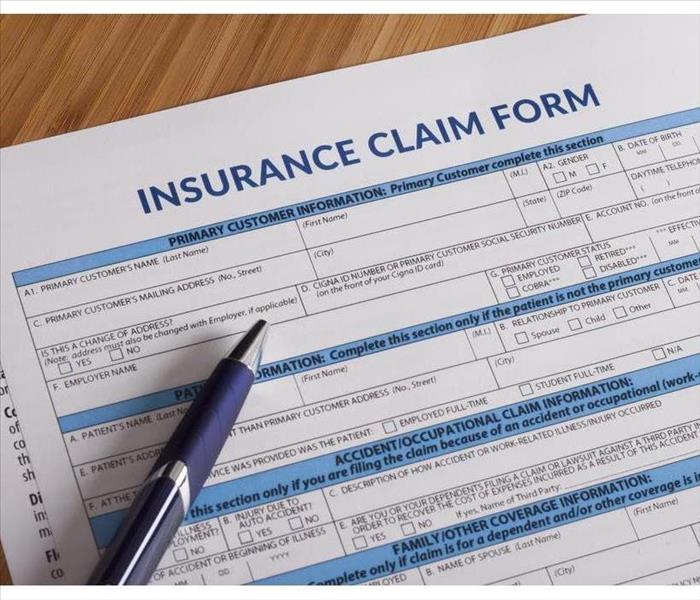 The sooner you make a claim, the sooner the storm restoration process can begin
The sooner you make a claim, the sooner the storm restoration process can begin
4 Steps to Ease Storm Repairs
Nature has a way of making a smooth-sailing business in Pulaski, TN, being forced to deal with water damage and other issues after a storm. In these cases, time is always of the essence, especially when water is concerned. Having to tear out saturated drywall, carpeting, and other porous materials may be key to prevent ongoing issues. After the storm passes, the following tips can help ease the process and get your business back on track.
1. Inspect the Property
Once it has been determined that the building is safe to enter, check the property for broken windows, flooding, leaks and other damage. If possible, board up windows and remove unaffected items to keep them from becoming damaged. The process of removing excess water should begin right away.
2. Document the Damage
Take photos of the interior and exterior. This includes detailed photos of equipment, furniture and other valuables that have been damaged. It is important to document any missing shingles, siding damage or other structural issues, as well as HVAC systems.
3. Make a Claim
The sooner you make a claim, the sooner the storm restoration process can begin. It is a good idea to keep your insurance representatives number saved in your phone for quick, immediate access. If other businesses or homes in the area received significant damage, an immediate call can help you be at the top of the list. When the adjuster comes, be onsite to assist with any questions.
4. Get Professional Help
Contacting a water remediation and restoration expert is key to getting your property back to “Like it never even happened.” They will perform a diligent inspection, including what isn’t always visible, and complete the necessary cleanup. During the restoration process, the experts have industrial tools to eradicate excess moisture, tear out damaged areas and replace what needs to be replaced. While they may have to tear out some portions, a trusted professional will do their best to salvage what they can to reduce your losses.
While dealing with storm damage can be an unexpected headache, having a plan and getting the right help can make it easier.
Our Experts Will Save The Day After A Flood
2/25/2020 (Permalink)
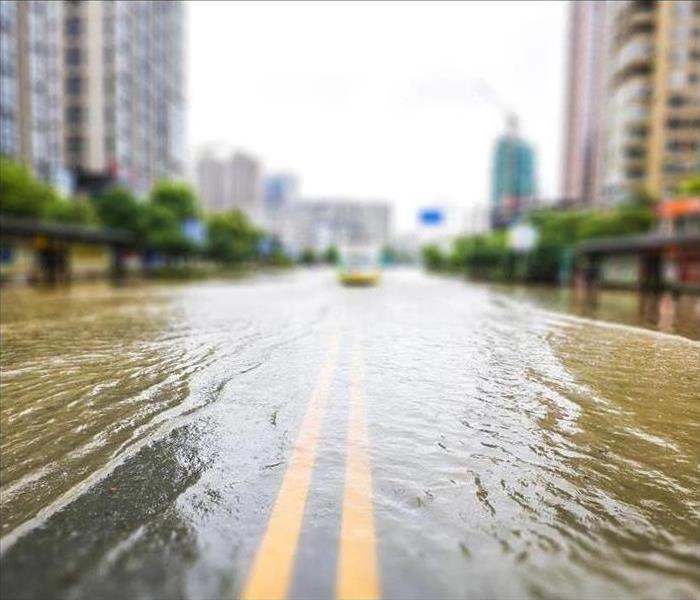 Our SERVPRO of Maury / Giles Counties water restoration technicians have the training and the tools to clean and dry up the mess.
Our SERVPRO of Maury / Giles Counties water restoration technicians have the training and the tools to clean and dry up the mess.
Broken Sprinkler System Can Flood a Columbia Plaza Construction
During the construction of new buildings throughout the Columbia area, investors and business owners alike work to see the job through to completion without unnecessary delays. Human error might account for many of these potential problems that push back opening dates for businesses within a newly constructed plaza, such as the improper installation of utilities or damaging overhead sprinkler units attached to active water lines.
With many sprinkler networks directly connected to the main supply of water to the buildings, your mid-construction Columbia plaza can quickly become flooded. In these situations, responding to the situation immediately is critical to help preserve affected materials as much as possible and prevent the spread of water damage throughout the property more than has already occurred. Our SERVPRO professionals can arrive fast to help slow the progression of this water as we get mitigation tactics underway to extract and dry the damaged areas.
Our rapid response team arrives with our industry-leading equipment designed to remove excess water from your buildings quickly and efficiently. From truck-mounted pumps to portable extraction machines, our technicians on site can effectively remove all of the pooling water fast to make our drying efforts to come more successful.
Flooding within your new construction can leave your investors and future business lessees uneasy. Taking care of the damages to the facility as promptly as possible is vital to re-establishing control of the situation and ensuring that with the help of our SERVPRO professionals, that these prospective businesses and franchise locations can open as planned. This assurance begins with a prompt response from our trained professionals equipped with the knowledge and equipment to make a difference fast.
While you cannot account for the likelihood of human error throughout the construction of a plaza, you can choose the right professional restoration team to overcome potential hazards and damages resulting from flooding. Our SERVPRO of Maury / Giles Counties water restoration technicians have the training and the tools to clean and dry up the mess. Give us a call anytime at (931) 388-4248.
Check out the Columbia Arts District for more information click here.
Spring Hill Stores Get Rescued from SERVPRO Water Loss Mitigation Services
2/25/2020 (Permalink)
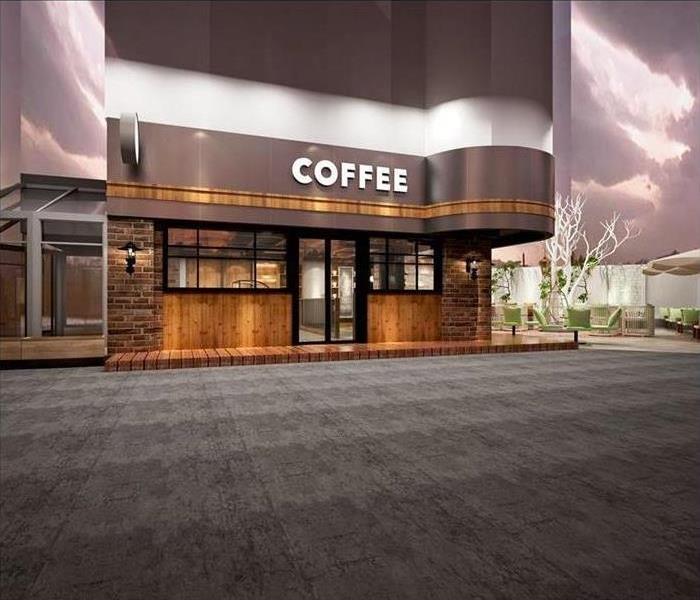 Commercial damage is our specialty
Commercial damage is our specialty
Fast Extraction Techniques for a Spring Hill Coffee Shop
When water loss incidents threaten your coffee shop, even isolated events like considerable spills can spread too quickly for your staff to keep up with and manage. The last thing that your shop needs is mold growth that shuts down your business until the appropriate personnel and inspectors can affirm that you are safe to rejoin the food and beverage industry. It is wise to reach out to professional restoration technicians like ours to help you limit loss and return the property to its original condition fast, whenever possible.
As the owner of the coffee shop in Spring Hill, you have many concerns that follow your need for water removal in the building. The first of these is all of the structures and woodwork that make up your counters, storage, and flooring. Our SERVPRO professionals have drying equipment that can keep these elements safe from necessary tear out and reconstruction if we get notified of the emergency quickly enough.
With water removal, extraction is the vital element that ensures that our technicians can begin the necessary restoration work as promptly as possible. We arrive with many different tools for this step, including gas-powered pumps, extraction wands with wet-vacs, and even portable electric sump pumps that can run off of generators we provide if your building has lost power.
Restoring elements like hardwood flooring, even high-quality laminates intended to look like hardwood, is often an intricate process. For preventing the excessive drying of these materials, our SERVPRO team installs large drying mats to slowly draw moisture out of the seams and planks until the desired moisture level gets reached. Overly drying materials like wood flooring can cause as many damages as allowing them to become oversaturated and distort.
Protecting your business after a water loss incident does not have to be complicated when you reach out to the right professional team. Our SERVPRO of Maury / Giles Counties technicians are standing by to help, 24/7, at (931) 388-4248.
Click here about our public library



 24/7 Emergency Service
24/7 Emergency Service















